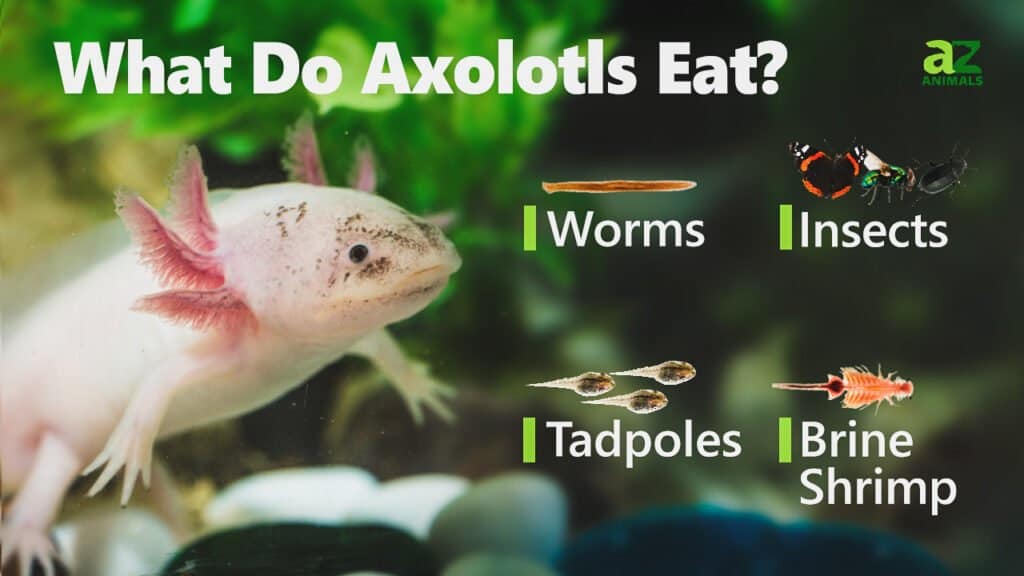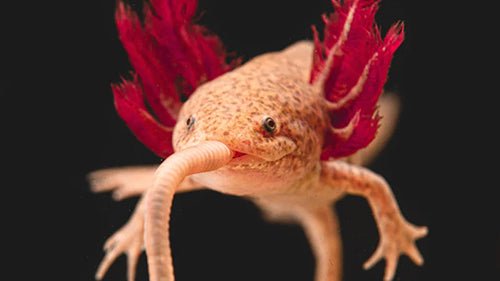Axolotls should be fed a diet that consists of live or frozen bloodworms, brine shrimp, and small fish. These aquatic creatures require a varied and protein-rich diet to thrive.
In addition to these main items, axolotls may also eat small amphibians, insects, and other small invertebrates. It’s important to only offer them food that is the appropriate size for their mouth, as they have a relatively small throat opening.
Providing them with a proper and balanced diet will contribute to their overall health and wellbeing.
Understanding The Nutritional Needs Of Axolotls
Axolotls have specific nutritional needs that must be understood to ensure their health. Their natural diet consists of small invertebrates, such as worms, insects, and crustaceans. These provide essential nutrients necessary for their growth and overall well-being. Proper nutrition is vital for axolotls, as it directly impacts their health.
A balanced diet helps maintain their immune system, promotes healthy organ function, and supports proper growth and development. Providing the right nutrients in appropriate quantities is crucial for their long-term survival. Axolotls can be fed a combination of live and commercially available foods specially formulated for their needs.
It is important to avoid overfeeding, as this can lead to obesity and other health issues. Regular monitoring of their weight and overall condition is essential to ensure they receive just the right amount of nutrition.
Best Food Options For Axolotls
Axolotls have specific dietary requirements to ensure their health and well-being. Live foods play a crucial role in their diet as they help simulate their natural feeding behavior. Commercially available axolotl food is a convenient option for owners, providing the necessary nutrients and vitamins.
However, homemade diets can also be beneficial, as they allow for a more varied and natural approach. Some suitable live food options for axolotls include bloodworms, brine shrimp, and daphnia. These foods are rich in protein and will help keep your axolotl healthy.
It’s important to ensure that any live food is appropriately sized to avoid any potential choking hazards. By carefully selecting the best food options for axolotls, you can support their growth and ensure their overall well-being.
Feeding Guidelines For Axolotls
Axolotls have specific dietary needs that must be met to ensure their health and wellbeing. When feeding axolotls, it is important to consider the frequency and portion sizes to avoid overfeeding or underfeeding. Axolotls should be fed small amounts of food several times a day rather than one large meal.
This helps mimic their natural feeding habits in the wild. It is recommended to feed them live or frozen foods such as bloodworms, brine shrimp, and small fish. When offering food, monitor their feeding behavior and remove any uneaten food to maintain water quality.
Additionally, it is important to avoid overfeeding as this can lead to obesity and other health issues. By following these feeding guidelines and techniques, you can ensure that your axolotl’s digestive system stays healthy and they remain happy and thriving.

Credit: a-z-animals.com
Factors To Consider In Axolotl Feeding
Feeding an axolotl requires careful consideration of various factors. The age and size of the axolotl play a crucial role in determining its dietary needs. Depending on the axolotl’s stage of development, its nutritional requirements will differ. Temperature and season are also important factors to consider.
Axolotls are coldwater creatures and their metabolism is influenced by the surrounding environment. Therefore, the temperature of the water and the season can affect their appetite and digestion. Additionally, it is essential to observe the axolotl’s behavior and preferences when it comes to feeding.
Some axolotls may have specific food preferences or eating patterns that need to be taken into account. By considering these factors, you can ensure that your axolotl has a healthy and balanced diet.
Potential Health Issues Related To Diet
Axolotls can experience various health issues related to their diet. One common problem is malnutrition, which can occur when the axolotls do not receive a balanced diet. This can lead to deficiencies in essential vitamins and minerals. Another issue is obesity and overfeeding, as axolotls have a tendency to overeat if given the opportunity.
These problems can be detrimental to their overall health and wellbeing. Therefore, it is important for axolotl owners to carefully monitor their diet and ensure they are getting the proper nutrition they need to thrive. By providing a well-balanced diet and avoiding overfeeding, axolotls can maintain their health and avoid these potential problems.
Adjusting The Axolotl Diet
One important aspect of keeping axolotls is adjusting their diet to meet their specific needs. When transitioning to a new diet, it’s crucial to do so gradually to prevent digestive issues. This is especially important during the breeding season as dietary changes can affect their reproductive health.
It’s also important to consider special dietary requirements for sick or injured axolotls, as they may need a different type or quantity of food. Care should be taken to provide a balanced diet that includes a variety of protein sources, such as small worms and brine shrimp.
Monitoring their feeding habits closely and consulting with a veterinarian can help ensure that your axolotls receive the proper nutrition to thrive.
Tips For Enhancing The Axolotl Diet
Enhancing the Axolotl Diet can be achieved by incorporating supplements and additives. These are crucial for providing essential nutrients that may be lacking in their natural diet. For picky eaters, feeding strategies need to be implemented to encourage them to consume a balanced diet.
Monitoring the weight and overall health of your axolotls is important to ensure they are getting the right amount of food. By observing their weight and health, you can make adjustments to their diet if needed. Ensuring that your axolotls receive a nutritious and well-rounded diet is vital for their overall well-being and longevity.
Frequently Asked Questions On Axolotl Diet
What Do Axolotls Eat?
Axolotls primarily eat small aquatic creatures such as worms, small fish, and insect larvae. They can also eat pellets specifically formulated for them. Providing a varied diet is important for their overall health and well-being.
How Often Should I Feed My Axolotl?
It is recommended to feed your axolotl 2-3 times a week. Overfeeding can lead to obesity and poor water quality. Remember to offer appropriately-sized portions and remove any uneaten food to maintain a clean environment.
Can Axolotls Eat Vegetables?
No, axolotls are carnivorous and do not have the ability to properly digest vegetables. Feeding them vegetables can cause digestive issues and potential health problems. Stick to their natural diet of animal-based protein for their nutritional needs.
Can Axolotls Eat Frozen Food?
Yes, axolotls can eat frozen food. Frozen bloodworms, brine shrimp, and daphnia are commonly fed to axolotls. It is essential to thaw the frozen food before offering it to them and ensure it is kept clean to prevent any contamination.
Conclusion
Providing a proper diet for your axolotl is crucial for their overall health and well-being. By understanding their natural diet and replicating it as closely as possible, you are ensuring that they receive the necessary nutrients for growth and development.
Feeding them a variety of live foods, such as earthworms, brine shrimp, and bloodworms, is essential to keep them active and thriving. A balanced diet should also include commercially available axolotl pellets or sinking amphibian pellets to supplement their nutritional needs.
It is important to avoid overfeeding your axolotl, as this can lead to obesity and other health problems. Regular monitoring of their diet and adjusting it as needed will help maintain their optimal health. By following these guidelines, you can provide your axolotl with a well-rounded diet that will support their longevity and ensure their happiness in their aquatic environment.
